Ecstasy Abuse

Ecstasy Abuse Treatment
Ecstasy abuse treatment is intended to help addicted individuals stop compulsive drug seeking and use. Treatment can occur in a variety of settings, in many different forms, and for different lengths of time. Because ecstasy abuse is typically a chronic disorder characterized by occasional relapses, a short-term, one-time treatment is usually not sufficient. For many, treatment is a long-term process that involves multiple interventions and regular monitoring.
The best ecstasy abuse treatment programs provide a combination of therapies and other services to meet the needs of the individual patient. There are a variety of evidence-based approaches to treating ecstasy abuse. Treatment can include behavioral therapy (such as individual or group counseling, cognitive therapy, or contingency management), medications, or their combination.
The specific type of ecstasy abuse treatment or combination of treatments will vary depending on the patient's individual needs and, often, on the types of drugs they use. Often, drug abusers will use more than one substance at a time, developing dependence problems to multiple drugs. The severity of addiction and previous efforts to stop using drugs can also influence a treatment approach. Finally, people who are addicted to drugs often suffer from other health (including other mental health), occupational, legal, familial, and social problems that should be addressed concurrently.
The best ecstasy abuse treatment programs provide a combination of therapies and other services to meet an individual patient's needs. Specific needs may relate to age, race, culture, sexual orientation, gender, pregnancy, other drug use, combined conditions (e.g., depression, HIV), parenting, housing, and employment, as well as physical and sexual abuse history.
If you're ready to admit you have an ecstasy abuse problem, congratulations! Recognizing that you have a problem is the first step on the road to recovery, one that takes tremendous courage and strength. Facing your drug abuse without minimizing the problem or making excuses can feel frightening and overwhelming, but recovery is within reach. If you're ready to make a change and willing to seek help, you can overcome your drug abuse and build a satisfying, drug-free life for yourself.
Once you've made the decision to challenge your drug abuse problems, it's time to explore your ecstasy abuse treatment choices. As you consider the options, keep the following in mind:
- There's no magic bullet or single ecstasy abuse treatment that works for everyone. When considering a program, remember that everyone's needs are different. Drug abuse treatment should be customized to your unique problems and situation. It's important that you find a program that feels right.
- Ecstasy abuse treatment should address more than just your drug abuse. Substance abuse affects your whole life, including your relationships, career, health, and psychological well-being. Treatment success depends on examining the way drug abuse has impacted you and developing a new way of living.
- Commitment and follow-through are key. Ecstasy abuse treatment is not a quick and easy process. In general, the longer and more intense the drug use, the longer and more intense the treatment you'll need. But regardless of the treatment program's length in weeks or months, long-term follow-up care is crucial to recovery.
- There are many places to turn for help. Not everybody requires medically supervised detox or an extended stint in rehab. The level of care you need depends on your age, drug use history, and other medical or psychiatric conditions.
